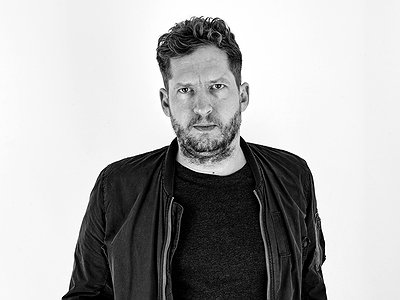Could you take us through a day in your life, from a possible morning routine through to your work? Do you have a fixed schedule? How do music and other aspects of your life feed back into each other - do you separate them or instead try to make them blend seamlessly?
Yeah I usually try and stick to “normal” working hours. I find the most productive and creative part of the day is the first part, so the more you can get done then, the better. I live near my studio so I wake up, do some emails, drink coffee, and walk 15 minutes and I’m there … It’s good in London if you can avoid having to use public transport!
I don’t think it’s possible to separate music from life really as it’s such a big part of it for most people, let alone someone working in it. I do find myself trying to take breaks from it when at home for example and walking around. I’m one of the few people these days that don’t wear headphones out and about. I actually enjoy hearing the sounds of the city around me.
There are many descriptions of the ideal state of mind for being creative. What is it like for you? What supports this ideal state of mind and what are distractions? Are there strategies to enter into this state more easily?
I look at it bit (I think) like someone who does meditation, you get lost in the process. That’s what I aim for. For example when I’m trying to jam around and come up with something interesting on the modular synth I can really lose myself in what I’m doing and in that moment there is literally nothing else that matters. No problems, no worries, just pure focus, concentration and a kind of beautiful meditative state which I guess is what they say in that world as “being present”. I don’t know because I don’t meditate but I feel like I get close when I play around with synths and drum machines, I get in a sort of hypnosis that is a good feeling.
How is playing live and writing music in the studio connected? What do you achieve and draw from each experience personally? How do you see the relationship between improvisation and composition in this regard?
Playing live can be a very important way in which you can bring ideas back into the studio and use them in what we’re writing. I spent a small period of my career doing live gigs, supporting Underworld as a dance act called Futureshock and many DJ performances. Now most of the artists I produce in the studio are DJs and I can see how they bring their experiences from playing live to thousands of people week in and week out back into the studio when we are creating together. It’s why the DJ/producer relationship has worked so well for decades of dance music. They will also use their gigs to test out versions of what we have made when they’re at a far enough point. This is a big part of the process actually and the single most important way to learn whether what you have created is going to work or not!
How do you see the relationship between the 'sound' aspects of music and the 'composition' aspects? How do you work with sound and timbre to meet certain production ideas and in which way can certain sounds already take on compositional qualities?
That's a good question actually where electronic and specially club music is concerned because it can be a very blurred line between the two. Sometimes you put certain sounds together and although technically the key may be slightly wrong or something else means they shouldn’t work, they do - and you scratch your head and never quite understand why!
My method of producing and writing is very much “in the moment”. I like to play around with the machines in the room, set them up to play sequences and spit out midi data and almost let them come up with the ideas. Then we choose the best bits, the bits which work and which don’t. So for me composition is about the sonic parts that work together and not necessarily the notation of them.
That’s not to say that the musicality doesn’t matter, but for me it’s more about capturing a moment in the studio, a moment where you look at each person in the room and without words sort of say - yeah that’s it, that’s the one! That’s what drew me to artists like Todd Terry in the 90s, it was that it didn’t have to be pitch perfect to sound great, it had to thump and have a groove and a rhythm that you could listen to for hours on end and never get bored of. It was just something that grabbed you that was like no other music out there at the time.
Our sense of hearing shares intriguing connections to other senses. From your experience, what are some of the most inspiring overlaps between different senses - and what do they tell us about the way our senses work? What happens to sound at its outermost borders?
I think sometimes the visual sense can get in the way a bit with what we are hearing in the studio and when it comes to writing anyway, it’s interesting actually how much these two are connected. Like the way tasting and smelling are so connected. Sometimes when working in the studio we will switch off the computer monitor in order to just listen and not see what’s going on on the screen, like the arrangement for example, when certain sounds come in, yours eyes can tell your ears to expect them but when you turn the screen off it’s just your ears doing the work which is how it will be for anyone else listening to the music ultimately.
I guess this can also work in a very positive way when it comes to live shows where you have interesting visuals in time with the music it can make for a nice experience.
Art can be a purpose in its own right, but it can also directly feed back into everyday life, take on a social and political role and lead to more engagement. Can you describe your approach to art and being an artist?
Well, I consider myself more as a record producer than an artist to be honest, although some may say the two are the same. When I work with artists in the studio, they are the ones who have the vision of what they want to achieve and they bring their ideas to the studio and transform them to the clubs. They are the ones that stand up on stage performing.
I mainly facilitate the ideas and make sure they get realised to the highest standard I can. I always found being an artist myself quite difficult actually, constantly second guessing whether what you’re doing is working or any good, changing your mind every time you listen. It can be tough for anyone who is writing and producing their own music totally on their own.
It is remarkable, in a way, that we have arrived in the 21st century with the basic concept of music still intact. Do you have a vision of music, an idea of what music could be beyond its current form?
I really don’t think we’re going to see or hear any dramatic changes to the actual form music takes, I think that’s been well and truly established over many years of its existence. Of course the way we produce music changes, the technology we use is changing every day and in a way influencing what sounds get made and therefore what the music sounds like, but styles seem to go around in cycles and maybe each time slightly re-invented with a new take but usually based on something we’ve heard before at some stage or another.



